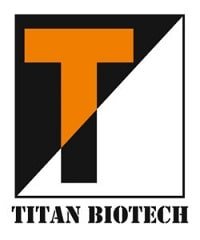Table of Content
- What is Peptone Powder?
- Composition of Peptone
- Type of Peptones
- Peptone Powder Uses
- Difference Between Peptone and Tryptone
- Why Choose Titan Biotech’s Peptone Powder?
What is Peptone Powder?
Peptone powders are derived from the breakdown of protein in plant or animal tissue, it is also known as peptone water and contains some sugar and other trace compounds.
Peptone is primarily obtained from bovine or porcine origin, such as meat, internal organs, gelatin, and milk, as well as from plants and yeasts. It is a partially digested protein and is prepared by the enzymatic or acidic hydrolysis of proteinaceous material.
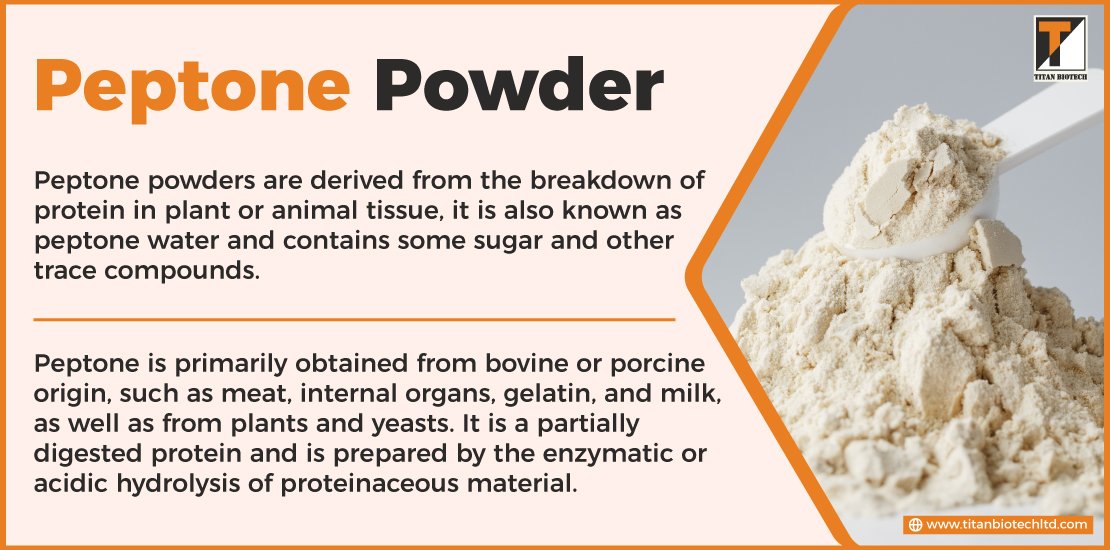
Peptone powder is a mix of peptides and proteins which are in the form of particles. This is an easy way to get it because many businesses do not have to create it from scratch. Peptone powder is a popular ingredient for making meat substitutes, making cheese and yogurt, making fertilizer, and more.
It is used in the commercial production of enzymes, vaccines, antibiotics, steroids, and other products. It is also used as a nitrogen source for mammalian cell culture formulations in which it serves as a supplement as well as a good alternative to serum. It is a rich source of nitrogen with high tryptophan content supporting the growth of fastidious organisms and also contains some essential amino acids such as lysine and methionine needed by organisms that cannot make them themselves due to incomplete metabolic pathways.
The powder is used in the food industry to make products such as cheese, processed meats, jams, canned fruits, and vegetables.
Peptone Powder ingredient is used in yeast extract for the production of nutritional supplements such as amino acids, vitamins, minerals, and enzymes. It is also used in pharmaceutical manufacturing to produce antibiotics and other drugs.
Composition of Peptone
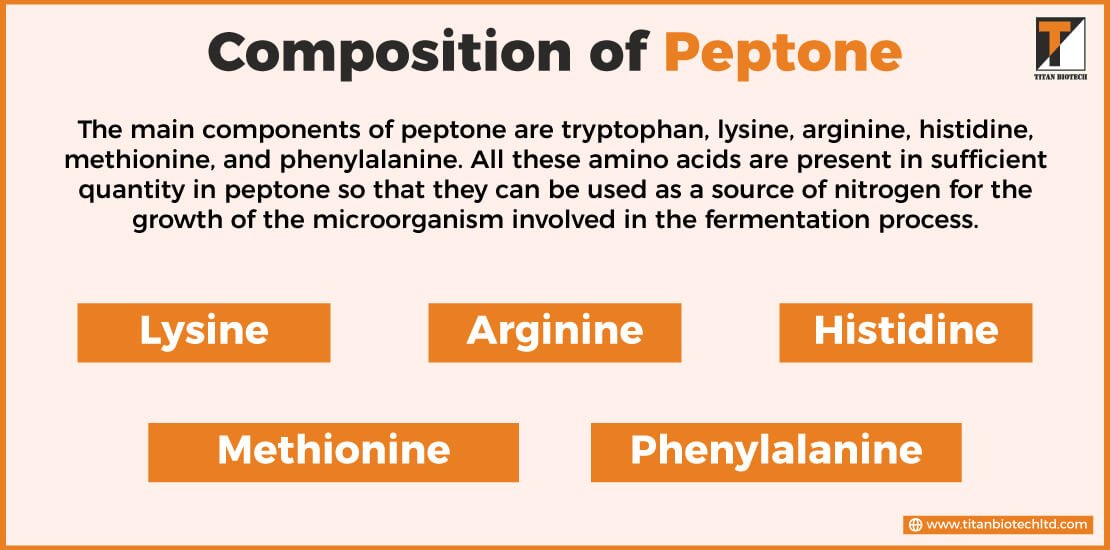
The composition of peptone is given as:
The main components of peptone are tryptophan, lysine, arginine, histidine, methionine, and phenylalanine. All these amino acids are present in sufficient quantity in peptone so that they can be used as a source of nitrogen for the growth of the microorganism involved in the fermentation process.
Peptone contains various nutrients like essential amino acids (amino acids not synthesized by the organism under study), vitamins, and minerals such as phosphorous, potassium and magnesium, etc., which are important for the growth of microorganisms involved in the fermentation process. They are composed mainly of inorganic salts, amino acids, vitamins, and carbohydrates. Peptones also contain some trace elements such as iron, copper, manganese, and zinc.
The peptone can be used as an alternative to animal blood serum as a growth factor supplement for the cultivation of bacteria and fungi. Peptone is widely used as an ingredient in food processing industries such as meatpacking plants and bakeries.
Type of Peptones
The three types of peptones are amphopeptone, antipeptone, and hemipeptone.
-
Amphopeptone
It is the most basic type of peptone. It is made by combining amino acids with water and then evaporating it to remove the excess moisture. It has a neutral pH and a low protein content. This makes it easy to use in many types of products, such as vaccines or food additives. Ampho Peptone is obtained from animal sources and is used in the production of human food additives such as hydrolysates and concentrates.
-
Antipeptone
It’s a peptone obtained from animal sources that have been treated with an alkaline solution (pH 10-11) to liberate its amino acids. Antipeptone has four amino acids: glutamine, alanine, aspartic acid, and threonine. It can be used in food preparations or as a nutritional supplement. Antipeptone is similar to amphopeptone but has lower levels of amino acids and less water content. Antipeptones are often used in cosmetics products because they can reduce the appearance of fine lines and wrinkles on the skin when applied topically. They also break down proteins more easily than amphopeptones do, which allows them to be used as an emulsifier instead of a stabilizer.
-
Hemipeptone
It is an alternative to both amipropepton and antipeptones because it contains all four amino acids: proline, lysine, arginine, and histidine (as opposed to only three). It is obtained by treating a peptide with HCl at elevated temperatures (80-90 degrees C), which cleaves off the side chains of lysine and arginine residues while leaving the carboxyl groups intact on their side chains. Hemipeptone consists of two peptides: α-amino-α-hydroxyisobutyric acid (AAIB) and α-amino-α.
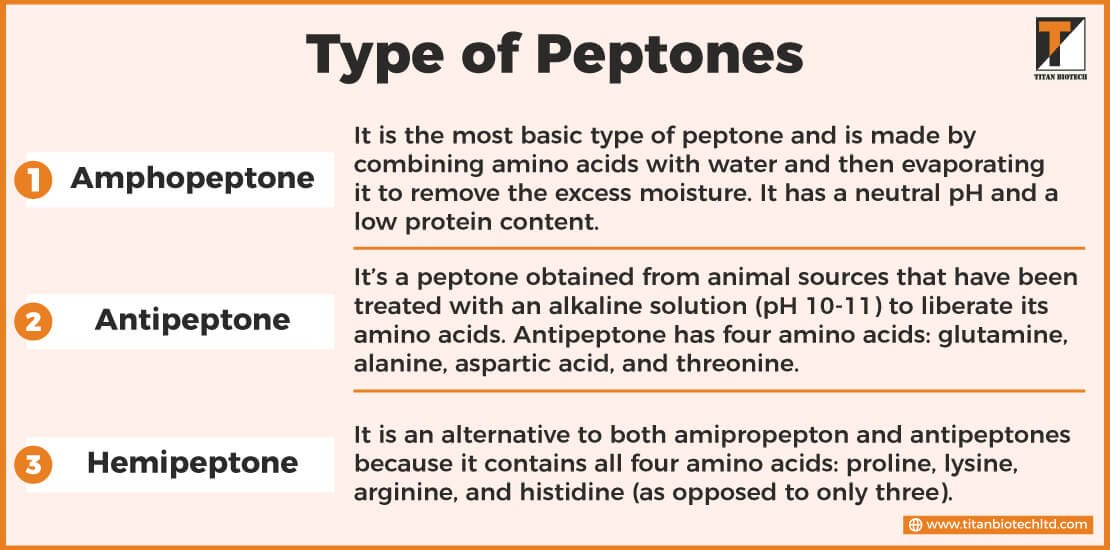
The main difference between the three is that amphopeptone has a higher molecular weight than antipeptone and hemipeptone. This means that it takes longer for amphopeptone to dissolve in water than it does for antipeptone and hemipeptone.
It also means that amphopeptone has more fat in its structure than antipeptone and hemipeptone do. This makes it more difficult for your stomach to digest.
Antipeptones are also known as dipeptides and are formed by the reaction of two amino acids at a time – usually alanine and valine (α-aminobutyric acid).
Peptone Powder Uses

Peptone Powder is made from high-quality peptone, which is a mixture of peptone, yeast extract, and sodium chloride. Peptone Paste & Powder has many applications in the lab and at home. It is used for the commercial production of enzymes, vaccines, antibiotics, steroids, and other products.
It is also known as L-glutamine salts, which are made by combining L-glutamic acid with L-glutamine and sodium chloride. The mixture is then dried and ground into a fine powder to be used in laboratories all over the world.
It can be used as a nitrogen source for mammalian cell culture formulations in which it serves as a supplement as well as a good alternative to serum. It is a rich source of nitrogen with high tryptophan content supporting the growth of fastidious organisms.
Difference Between Peptone and Tryptone
The difference between peptone and tryptone is that tryptone is derived from the digestion of milk only. Agrobacterium would derive a greater portion of their nutrition from animal cells (meat) than milk.
The two types of nitrogen sources are usually supplied at 0.5% and 1% concentration in the media, respectively (Dunn and Hanks, 2002).
Tryptone is a mixture of amino acids that can be used as a nitrogen source for gram-positive bacteria such as E.coli, Enterococcus faecalis, and Bacillus Subtilis. Tryptone helps to maintain high levels of cell growth in these bacteria and also allows them to grow on minimal amounts of glucose (Gibson et al., 2007; Gibbons et al., 2008).
The difference is that peptones are more complex than tryptone. Tryptone is just a mixture of amino acids and carbohydrates, but peptones contain vitamins and minerals as well.
The difference in the types of enzymes used for hydrolysis is also important. Hydrolysis includes all processes that break down peptides and other proteins into smaller molecules (amino acids). This can be done by enzymatic action or chemical action, depending on which enzyme is used. Tryptosynthesis is an example of enzymatic hydrolysis; trypsin breaks down peptides into individual amino acids, whereas chymotrypsin breaks down peptides into dipeptides (or tripeptides).
| Particulars | Peptone | Tryptone |
|---|---|---|
| Definition | Peptone is a water-soluble mixture of polypeptides and amino acids formed by the partial acid or enzymatic hydrolysis of protein. | Tryptone is a water-soluble mixture of peptides formed by the digestion of casein by the enzyme trypsin. |
| Produced By | Acid or enzymatic hydrosols | Enzymatic digestion or hydrolysis |
| Enzymes Used for Production | Trypsin, papain, alcalase, bromelain, ficin, pepsin and pancreatin | Trypsin |
| Sources for Production | Meat, internal organs, gelatin, milk, plants (soy) and yeasts | Milk |
| Contains | Contains polypeptides and amino acids | Contains oligopeptides |
| Uses | It is used in culture media to grow different kinds of microorganisms, and it is also used as a nutrient for industrial fermentation processes such as vaccine production. | It is added to culture media as an accelerator in microorganism culturing, and it is commonly used to produce lysogeny broth (LB) in order to grow E. Coli. |
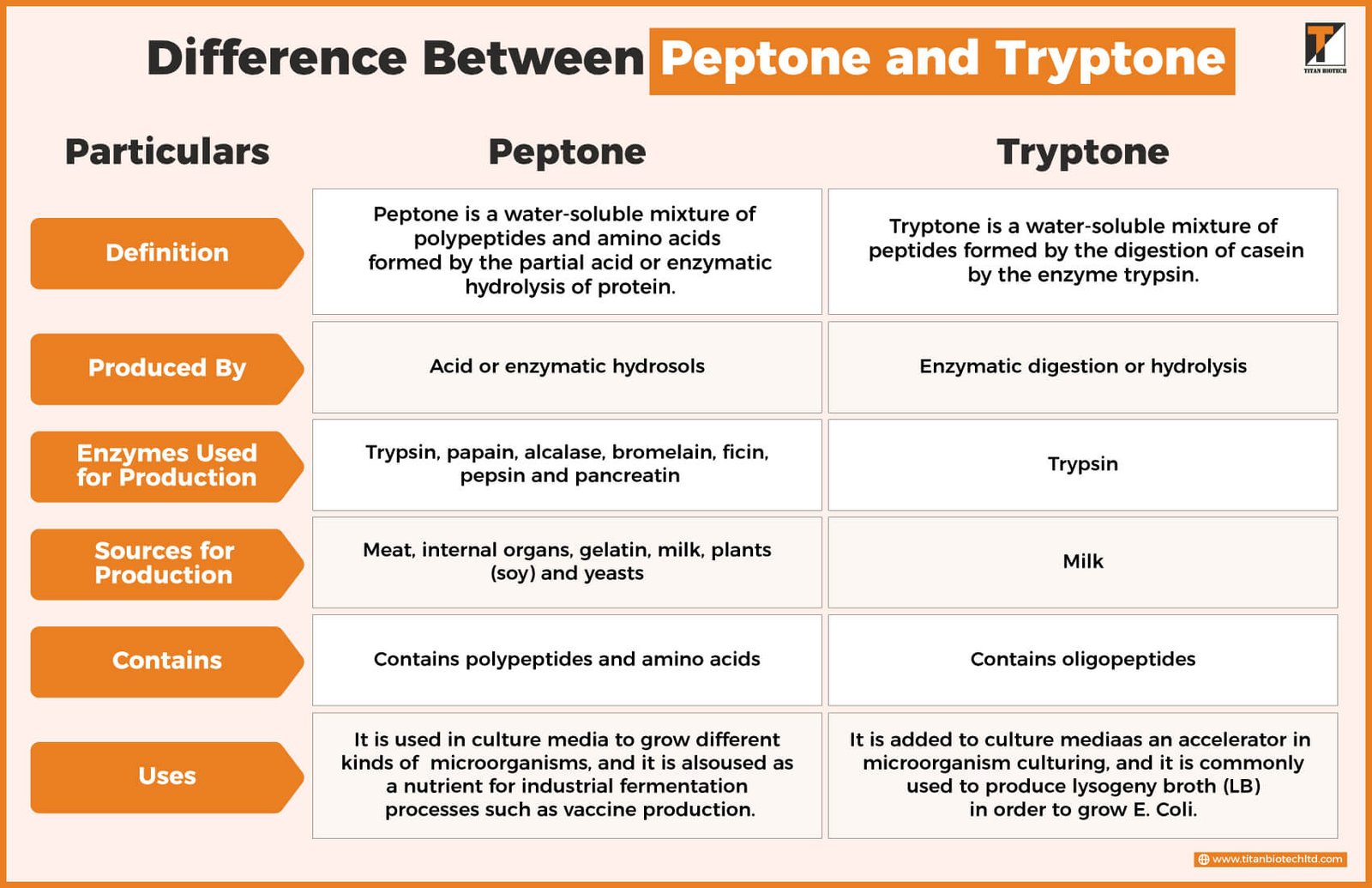
Why Choose Titan Biotech’s Peptone Powder?
Titan Biotech is a leading manufacturer and supplier of peptone powder & paste in a wide range of brands. The company offers superior quality at affordable prices. We offer a variety of peptone paste and powder that meet other businesses’ requirements. Our products are available to our clients across the country.
We offer a comprehensive range of peptone powder & paste through our wide network of dealers. At Titan Biotech, we provide our customers with exceptional quality products at affordable prices. Our products are made from natural ingredients, which makes them suitable for both laboratory and industrial use.
Our range includes:
-
Vegetarian Peptone Powder
It is used to prepare media for testing bacteria and fungi in the laboratory or industrial-scale fermentation process. It is also used in the preparation of media fill trials.
-
Non-Vegetarian Peptone Powder
It is used to prepare media for testing bacteria and fungi in the laboratory or industrial-scale fermentation process. It is also used in the preparation of media fill trials.
References
- https://link.springer.com/article/10.1007/BF00761775
- https://link.springer.com/article/10.1007/s00284-006-0308-y
- https://iopscience.iop.org/article/10.1088/1755-1315/160/1/012007/meta
- https://www.ncbi.nlm.nih.gov/pmc/articles/PMC4649854/
- https://www.differencebetween.com/what-is-the-difference-between-tryptone-and-peptone/

